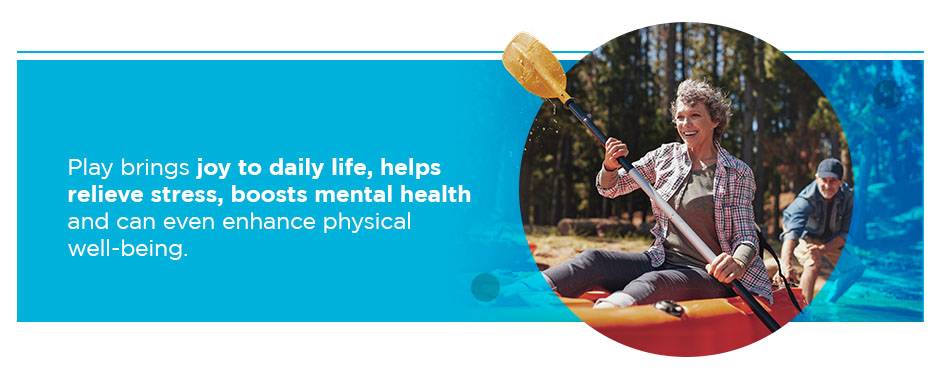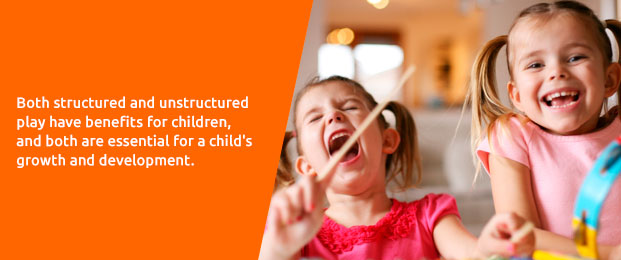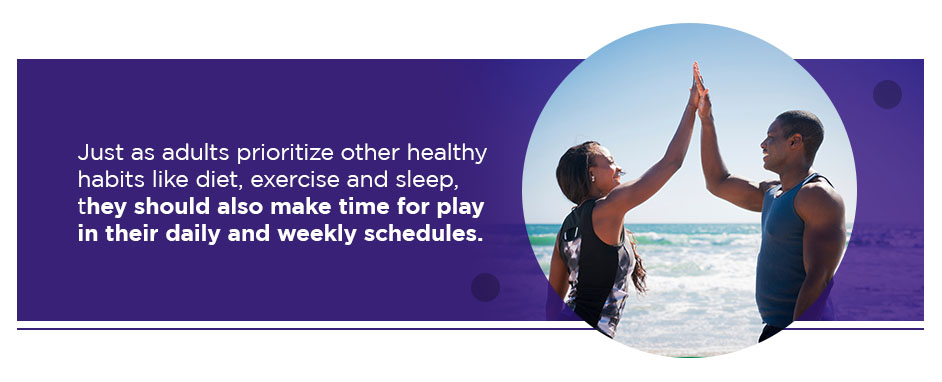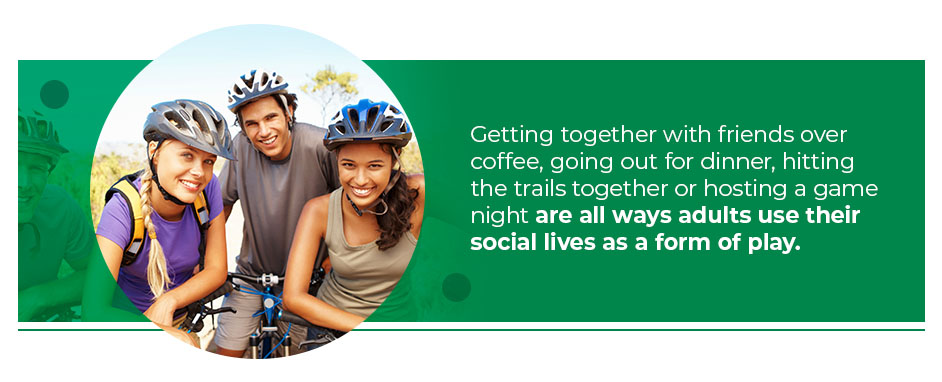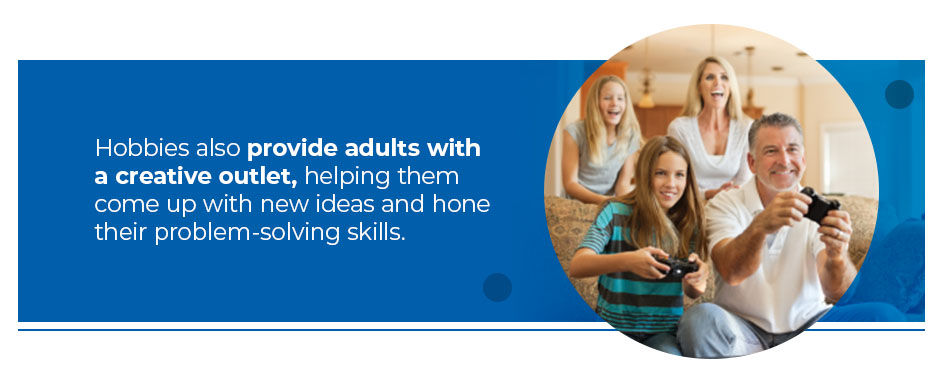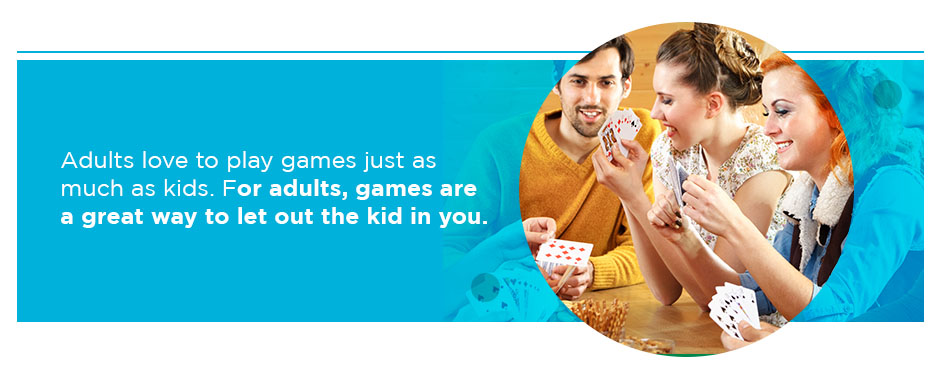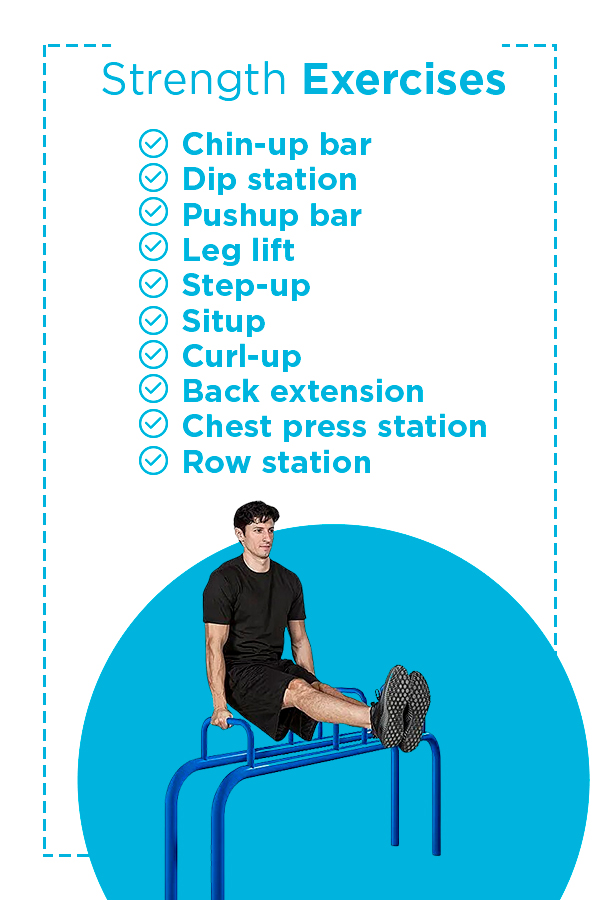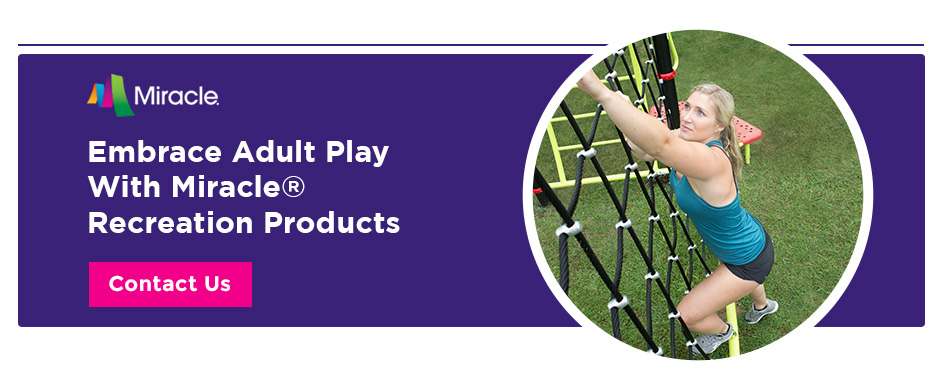The Importance of Play in Adulthood
We all know that kids love to play and that play is crucial for healthy child development. But what about play in adulthood? As we age, we tend to let go of the kid in us, focusing instead on the responsibilities and priorities of adulthood. But adults can benefit from taking time to play just as much as kids.
Read the full article or jump to a specific section:
- Why Is Play for Adults Important?
- How Does Play Influence Health?
- What Types of Play Are Best for Adults?
- How Can You Combine Play and Exercise in Adulthood?
With stress levels rising, more researchers are emphasizing the importance of adults playing. Play brings joy to daily life, helps relieve stress, boosts mental health and can even enhance physical well-being. There are many ways for adults to incorporate more play into their lives. Adults can find opportunities to play more, from hobbies and interests to exercise and sports. In particular, outdoor exercise can increase exercise enjoyment and adherence, two crucial ingredients in encouraging people to be more active.
Why Is Play for Adults Important?
Play for adults is essential for various reasons. Playing allows kids to develop their cognitive, emotional and behavioral skills, and it has similar effects for adults. Adults need playtime to relax, recharge, reconnect and reinvest in their self-care. With so many responsibilities and obligations packed into busy schedules, adults rarely find time for play. But taking time out of your daily life to prioritize downtime and enjoyment is vital to health and well-being.
Below are four ways that play is crucial for adults.
- Keeps adults young at heart: Adults can tend to get bogged down in life’s day-to-day chores and requirements. Losing a spark of joy can have significant consequences on adults, their friends and family and the community at large. By committing to playtime, adults can find their inner child once more and reconnect with the joy they felt when they were a kid.
- Stimulates creativity: Everyone is creative — but they don’t always know how to tap into it. Playtime gets adults out of their routines, putting them in new and exciting environments and situations, which can ignite creativity. Adults may find that when they return from playing, they have new perspectives and ideas they may not have thought of otherwise.
- Helps relieve stress: Stress is an ongoing public health issue affecting millions of adult Americans. Without ways to unwind, adults remain in a steady state of fear response, which has long-term impacts on health and well-being. Playtime is a natural de-stressor, letting adults put their worries aside and enjoy the present moment. The more often adults can prioritize playtime, the better they can become at managing and reducing stress naturally.
- Enhances social connections: A survey found that 36% of respondents described themselves as feeling seriously lonely. Humans are social creatures, and we require human connection just as much as basic necessities like nourishment and sleep. Adults experiencing loneliness can benefit from including more playtime in their lives. Play is a social practice, often involving friends, family members and other community members. Spending more time in play can help enhance the social connections adults need to thrive.
How Does Play Influence Health?
Play for adults can result in numerous positive health outcomes. Play offers physical, psychological, emotional and social health benefits that extend into daily life. Just as adults prioritize other healthy habits like diet, exercise and sleep, they should also make time for play in their daily and weekly schedules.
Consider these benefits of play for adult health and well-being.
- Encourages physical activity: More than 60% of U.S. adults are not engaging in enough physical activity. The Centers for Disease Control and Prevention recommend 150 minutes per week of moderate-intensity exercise. Many people don’t exercise frequently enough because they don’t enjoy it. Play is an ideal way to boost enjoyment and engagement in physical activity. Active play promotes an increase in exercise, which is vital to long-term health and disease prevention.
- Promotes mental well-being: With the rates of depression and anxiety increasing among Americans, it’s essential to find ways to promote better mental well-being. Play for adults is a naturally enjoyable endeavor, helping adults reconnect with their emotions and find happiness and joy in something they love. The endorphins released during play can boost positive feelings and ease negative emotions, which can help mediate mental health over time.
- Improves brain health: Keeping a sharp, healthy brain is critical to maintaining a high quality of life. Stress and cardiovascular disease are two significant risk factors for developing Alzheimer’s disease. Adults of all ages can adopt healthy lifestyle habits to help reduce their risk of cognitive impairment and boost their brain health. Since play helps reduce stress, improve emotional well-being and optimize physical health, adults should focus on ways to incorporate more play into their daily life so they can continue to experience excellent brain health.
- Boosts intimacy in relationships: Over the years, numerous studies have found that married people or those in intimate relationships are happier. Relationship quality predicts happiness. Further research has found that laughter and play between partners is a key ingredient in relationship well-being. To reap the rewards of an intimate relationship, partners should prioritize laughter, enjoyment and playtime to strengthen their bonds.
What Types of Play Are Best for Adults?
Adult play takes on a range of forms. Unlike play that kids undertake, adults don’t tend to use a slide or head for the swing set. Instead, adult play looks more like downtime, taking a break from the daily responsibilities of life to recharge their batteries. Since everyone is unique, what’s revitalizing for one person may not be for another.
Here are five different ways adults can play.
1. Social Interactions
One of the most common types of play adults engage in is making time for their social life. Getting together with friends over coffee, going out for dinner, hitting the trails together or hosting a game night are all ways adults use their social lives as a form of play.
Humans are social animals, and feeling connected to others is vital for psychological and physical well-being. Copious research has found that loneliness, social isolation or dissatisfaction with your social life puts you at greater risk of psychological disorders, including depression. A chronic lack of social interaction can also affect your physical health. Studies show untreated, chronic loneliness can increase the risk of Type 2 diabetes, heart disease, hypertension, sleep disorders and substance use.
Living a life that’s more abundant in social connections can enrich your life in the following ways:
- Boosts mood and makes you feel happier
- Creates a sense of safety and belonging
- Provides a network of people to confide in and rely on for support
Even brief and unstructured social interactions can leave people feeling happier and more connected. A study found even social interactions between people who have weak ties, such as with acquaintances, correlate with stronger social and emotional well-being.
2. Hobbies and Interests
Just as kids like to play with arts and crafts or building blocks, adults also like to spend their time working on hobbies and interests. Participating in projects, hobbies or interests is a great way to get adults playing. Adults can find enjoyment and downtime in pursuing these activities, and they can also use it as a path to further self-discovery. Many adults try out new hobbies, eventually settling on the ones that allow them to feel fulfilled and expressed.
Adults pursue pastimes out of pure enjoyment rather than a necessity or obligation. Because of this, hobbies allow adults to immerse themselves in the present moment, leaving behind daily stressors and worries. Hobbies also provide adults with a creative outlet, helping them come up with new ideas and hone their problem-solving skills. Overall, activities are vital for mental health and well-being and enrich our lives.
Adults can spend time on a vast array of things. Here are some popular ones adults enjoy:
- Music
- Food
- Reading and writing
- Travel
- Pets
- Video games
- Health and fitness
- Arts and crafts
Many adults have more than one hobby, making time for many different interests in their lives. Spending time exploring different hobbies is crucial for adding more meaning and enjoyment to daily life.
3. Organized Sports
Organized sports aren’t only for kids or professional athletes. Many adults enjoy playing sports, whether it’s an impromptu touch football game with neighbors or a community intramural league. Sports provide adults with numerous health benefits, including physical exercise, social connections and stress relief. Playing sports into adulthood can also improve problem-solving skills and cognitive function.
Despite all the advantages of sports for adults, many people who enjoyed playing sports as kids eventually stop by young adulthood. According to experts at Harvard, adults quit sports due to a lack of time, interest or accessibility, plus health issues that prevent them from it.
Other experts say that adults who loved to play sports as kids could benefit from recreational sports in adulthood. They cite evidence showing playing sports can help you continue developing skills like:
- Time management
- Discipline
- Regulating emotion
- Self-esteem
Additionally, being part of an active recreational sports team can help alleviate depression and anxiety symptoms. Playing team sports is naturally motivating, which can give people a sense of purpose, accomplishment and direction. Having a weekly game or ongoing practices can also give adults something to look forward to in their week.
And the good news about playing casual sports is that you come to realize it’s not all about winning. Knowing you’ll lose a game now and then can also help adults build self-awareness, cooperation and leadership skills.
4. Games and Challenges
Adults love to play games just as much as kids. For adults, games are a great way to let out the kid in you. The sillier the game, the better as it allows adults to remain in the present moment, filled with laughter and enjoyment. Plus, the healthy competition of a challenging or fun game is a positive thing to add to your life.
Some examples of popular ways for adults to enjoy games and challenges include:
- Board game nights
- Murder mystery parties
- Sports days
Whether it’s with a group of friends, a neighborhood block party or a family cookout, there are lots of opportunities for adults to have fun with games.
Another way adults can play is to sign up for a challenge. These competitions usually involve fitness, such as 30-day workout challenges, but they can involve various themes. The ice bucket challenge during the summer of 2014 is a good example of adults around the world playing together for a good cause.
Another popular way that adults can play is to sign up for a challenge. These competitions usually involve fitness, such as 30-day workout challenges, but they can involve a variety of different themes. The popular ice bucket challenge during the summer of 2014 is a good example of adults around the world playing together for a good cause.
5. Playing With Animals
Around 70% of households in the United States have at least one pet. Dogs and cats are the first and second most-owned types of animals. Many people enjoy the companionship of their pets, from going on walks to cuddling at home. As the popularity of pet ownership has grown, so have studies on the possible advantages of playing with animals.
Spending time with a pet provides several health benefits, including decreased levels of cortisol, the primary stress hormone. Petting an animal is relaxing and comforting, which is why many hospitals and assisted living homes enlist the help of furry friends to cheer up their patients. Owning an animal can meet some of your social needs for connection and provide a sense of purpose. After all, pets rely on humans to feed and love them.
Owning a pet or spending time around animals is also an ideal way to incorporate more play into your life. Many animals enjoy all kinds of play, especially puppies and kittens. Taking a dog to the park and throwing a ball allows adults to get outside, be active and spend time playing. Whether through active play like a game of fetch or calmer activities like waving around a cat toy, playing with animals is fun.
If you can’t or don’t want to include a pet in your life full-time, you can volunteer to spend time around animals in other ways. Here are a few ideas for spending more time playing with animals:
- Foster animals in need
- Volunteer at a veterinary clinic
- Offer to walk your neighbor’s dog
- Help train service animals like guide dogs
- Cat-sit for your friend on vacation
6. Spending Time Around Kids
Kids are naturally playful people. Young babies like to play with blocks, soft toys and simple games like patty-cake. As kids grow, their motor skills develop, and they may enjoy playing on the playground or participating in sports. Older kids also learn to use their imaginations and create make-believe worlds full of exciting adventures and fantastic characters. Play helps kids develop socially, physically, emotionally and in many more ways.
Playing with kids can also benefit adults in significant ways. If you are a parent, spending time playing with your little ones is an excellent way to forge stronger family relationships. Playing with your kids allows you to set aside time to give them your undivided attention, get to know them and participate in their world. A survey of over 37,000 kids worldwide found that those with higher family connections reported higher levels of flourishing. By playing with your kids, you help them thrive.
New research shows that being around young people is especially beneficial for the elderly. Many older people seek connection, purpose and excitement, and playing with kids is a great way to experience those things. Goofing off, playing games and joining in with kids’ imaginative stories can raise your spirits and help you explore your creativity. Whatever your age, playing with kids can revive your worldview, spark joy and teach you a few lessons about being young at heart.
If your kids are older or you don’t have any kids, you can still make time for playing with little ones in your family or community. Look for opportunities like these:
- Volunteering at a day care or children’s hospital
- Joining intergenerational social groups like civic organizations
- Spending time with your family members’ kids
- Volunteering at a local college
7. Outdoor Exercise
Everyone needs daily exercise. But for many people, exercising indoors, such as at a gym or recreation center, starts to feel like going through the motions after a while. Especially in the summer when the weather is nice, taking your exercise routine outdoors is an excellent way to add more play to your life.
Outdoor exercise can be more beneficial than indoor exercise in the following ways:
- Increases your motivation
- Helps you stick to your goal
- Boosts positive mood and relieves negative emotions
- Elevates self-esteem
- Enhances social well-being
- Connects you with nature
- Makes exercise more enjoyable
The benefits of exercise combined with the enjoyment of being outside make it more likely that adults will want to work out. Compared to indoor exercise, people who exercise outdoors are more likely to keep up with their fitness plan. Adults who exercise outdoors also report feeling greater self-esteem and social well-being.
There are plenty of options for outdoor exercise. Walking and hiking trails or nature paths allow adults to connect with nature and exercise at their preferred pace. Outdoor sports fields and jogging tracks let adults get in their aerobic exercise. Additionally, many local communities have outdoor fitness parks, which encourage adults to perform strength and resistance training exercises.
How Can You Combine Play and Exercise in Adulthood?
Adults should commit to a lifelong exercise habit to help improve health, prevent illness and enhance quality of life. A lack of physical exercise can contribute to heart disease, Type 2 diabetes, obesity and some cancers. Since most adults don’t meet the exercise recommendations, they should find ways to incorporate more activity into their lives in ways they enjoy.
Enjoyable physical exercises can feel like play. By combining play with exercise, more adults will be willing to get the activity they need to thrive. Outdoor adult fitness parks contain exercise equipment designed to give adults two types of exercise they need — strength to build muscle and coordination to improve balance and mobility.
Strength Exercises
Strength training exercises help build muscle over time. Different exercises target specific muscle groups, which help isolate and build strength in key areas. In addition to building strength, resistance training can also help encourage fat loss when combined with cardio exercise.
Many people enjoy strength and resistance training for the challenge and the satisfaction of building their endurance. Below are some of the best types of outdoor fitness equipment for adults to improve muscle tone and have fun exercising outside.
- Chin-up bar: Strengthen your back, shoulders and biceps and challenge yourself by beating your best on the chin-up bar.
- Dip station: Strengthen your triceps and upper-body stabilizer muscles with triceps dips at the dip station.
- Push–up bar: Push-ups are an upper-body exercise for your triceps, chest and shoulders. Practice proper form and perform more reps using a push-up bar.
- Leg lift: Leg lifts are a fantastic core exercise, working the abdominal muscle group and the low back. Build core strength by practicing leg raises on the leg lift station.
- Step-up: Step-ups are a fun and challenging exercise that help build quad, glute and hamstring strength. Build your lower-body strength with the step-up station.
- Sit–ups: Sit-ups are a classic abdominal exercise, but they also help strengthen hip flexor, chest and neck muscles. Practice your sit-ups and shape your core muscles at the sit-up bench.
- Curl-up: As reverse sit-ups, curl-ups also help strengthen abdominal muscles, but they target the lower abdominals. Improve your core strength and stability with the body curl bench.
- Back extension: Lower back health is vital to strength, stability and coordination. Strengthen your lower back muscles with the hyperextension bench.
- Chest press station: Push exercises work the chest, shoulders and triceps. Grow your chest strength with the press station.
- Row station: Rows are a pull exercise that helps grow your back and bicep muscles. The row station will help you strengthen your back, spine and joints.
To get a full-body workout, combine several of the above exercises into your workout, helping balance your body and build total strength.
Coordination and Mobility Exercises
Coordination and mobility exercises are vital for all adults to incorporate into their physical activity. Maintaining high levels of motor coordination, stability and balance protects adults from injuries and falls as they age. Mobility exercises help adults continue to live a high quality of life not limited by mobility restrictions.
Many people find mobility and coordination exercises enjoyable because they’re a good personal challenge and easy to turn into a friendly competition with others. Below, learn about some of the outdoor fitness equipment that will help you with coordination and mobility.
- Balance beam: The balance beam helps adults increase their proprioception, which is their awareness of their body in space. Balance practice is also essential for the vestibular system, which allows you to coordinate your movements in relation to gravity.
- Beam jump: Beam jumps are an excellent body-weight resistance exercise that also helps improve stability and coordination. Practicing beam jumps can also help you improve endurance.
- Monkey bars: Monkey bars are a fun activity and fitness park favorite. They help with upper-body strength and can also improve mobility, coordination and posture.
- Rope climb: Rope climbing is an excellent physical and mental challenge. It builds upper-body strength, grip, coordination and mobility.
Combining strength training and coordination exercises can help adults improve their physical health and mobility, extending their longevity.
Embrace Adult Play With Miracle® Recreation Products
Adults need to keep play alive, spending time each week to let out their inner kid. Outdoor exercise is an ideal way to combine the necessity for exercise and play. Improve physical and emotional health with outdoor fitness parks for adults.
Miracle Recreation provides innovative and durable outdoor fitness equipment for adults. Learn more about the types of outdoor fitness equipment available for parks, schools, recreation spaces and more. Find a Miracle Recreation distributor near you or request a quote to get started!


